

Perhaps “the” food film of all time. Gastronomes all over the world pay homage by getting friends together to replicate her feast (or they try to). Who was Babette and what was her feast all about? Click here to buy the DVD.
July 2006
|
 |
Dramas
My Kingdom For A Croissant!
In our opinion, the best kind of dinner and a movie has no restaurant tab, no date and no awkward moment at the end of the night. All that you need for the ultimate food-and-flick experience is one of the films we’ve chosen below, a sofa and plenty of tasty snacks...that follow the theme of the film, of course! Invite a date, by all means: these films are too wonderful not to share. Too mushy for you? Then click here to explore other genres.
Click here to tell us about your favorite films or food scenes.
|
|
Age of Innocence
Martin Scorsese does not sound like the logical choice to direct an adaptation of Edith Wharton's novel about manners and morals in New York society in the 1870s. But these are mean streets, too, and the psychological violence inflicted between characters is at least as damaging as the physical violence perpetrated by Scorsese’s usual gangsters. At the center of the tale is Newland Archer (Daniel Day-Lewis), a somewhat diffident young man engaged to marry the very respectable May Welland (Winona Ryder). But Archer is distracted by May’s cousin, the Countess Olenska (a radiant Michelle Pfeiffer), recently returned from Europe. As a married woman seeking a divorce, the countess is an embarrassment to all of New York society. But Archer is fascinated by her quick intelligence and worldly ways. Scorsese closely observes the tiny details of this world and this impossible situation; this is a movie in which the shift of someone’s eyes can be as significant as the firing of a gun. The director’s sense of color has never been keener, and his work with the actors is subtle. That’s Joanne Woodward narrating, telling us only as much as we need to know—which is one reason why the climax comes as such a surprise.—Robert Horton, from Amazon.com
Click here to purchase the DVD. |
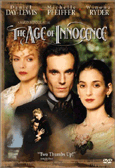 |
Alice Doesn’t Live Here Anymore
Having scored a critical triumph with Mean Streets, Martin Scorsese accepted Alice Doesn’t Live Here Anymore as his first big-studio assignment, proving his versatility and further advancing his promising career. Hot off The Exorcist with her choice of projects at Warner Brothers, Ellen Burstyn sought a hot young talent (Scorsese was recommended by Francis Coppola) to direct Robert Getchell’s fine, sensitive screenplay about Alice Wyatt, a newly-widowed 35-year-old lounge singer with a bratty 12-year-old son (Alfred Lutter) and a very uncertain future. Her pursuit of broken dreams lands her a waitressing job in an Arizona diner, where she befriends foul-mouthed Flo (Diane Ladd) and meets and falls in love with a divorced farmer (Kris Kristofferson). With absolute authenticity of emotion and incident, Alice—which earned Burstyn a well-deserved Oscar® and features supporting roles for future Taxi Driver costars Jodie Foster and Harvey Keitel—conveys a then-timely sense of strength and endurance from a single mother in desperate times. There have been several similar dramas made since 1974, but Alice (which inspired the popular TV sitcoms Alice and Flo) is still the best. Trivia buffs: Look closely for Ladd’s daughter—a very young Laura Dern—and Scorsese as background extras in the diner scenes.—Jeff Shannon, from Amazon.com
Click here to purchase the DVD. |
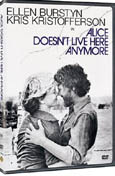 |
Alice’s Restaurant
You can get anything you want there, or so went Arlo Guthrie’s song, a lengthy monologue about a Thanksgiving dinner and how its aftermath kept Guthrie out of the Vietnam-era draft. Arthur Penn’s movie version, which stars Guthrie, James Broderick, and Pat Quinn, has a shambling, good-natured feel, much like Guthrie’s epic tall tale. But as it follows Guthrie’s adventures (he gets arrested for improper disposal of Thanksgiving garbage and the arrest renders him unfit for military service, in the draft board’s eyes), it also examines the freewheeling nature of relationships in that period—and the toll that freedom took on those relationships. Guthrie is a natural performer, particularly funny during the draft board sequence; but the heart of the film is Quinn and Broderick’s troubled marriage.—Marshall Fine, from Amazon.com
Click here to purchase the DVD. |
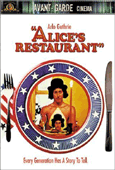 |
Babette's Feast
Some movies can only be described as delicious. In Babette's Feast, a woman flees the French civil war and lands in a small seacoast village in Denmark, where she comes to work for two spinsters, devout daughters of a puritan minister. After many years, Babette unexpectedly wins a lottery, and decides to create a real French dinner—which leads the sisters to fear for their souls. Joining them for the meal will be a Danish general who, as a young soldier, courted one of the sisters, but she turned him away because of her religion. The village elders all resolve not to enjoy the meal, but can their moral fiber resist the sensual pleasure of Babette’s cooking? Babette’s Feast deservedly won the 1987 Academy Award for Best Foreign Language Film. This lovely movie is impeccably simple, yet its slender narrative contains a wealth of humor, melancholy, and hope.—Bret Fetzer
Click here to purchase the DVD. |
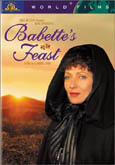 |
Big Night
Big Night is an intimate look at the immigrant struggle to attain the American Dream, set in New Jersey in the 1950s. Its disproportionate success gave co-directors Stanley Tucci and Campbell Scott, who also star in the picture, the green light to follow up with a smug, unsuccessful second venture called The Imposters. Tucci wrote Big Night with his cousin Joseph Tropiano, and they based the story on the experience of growing up in a large, proud Italian family. The brothers in Big Night—chef Primo (Tony Shalhoub) and businessman Secondo (Tucci)—have come to New Jersey to open a bistro named The Paradise that serves the finest in traditional, authentic Italian cuisine. Big Night is a film that will easily invite comparisons to other “food” fare like Babette’s Feast and Eat Drink Man Woman but, though Tucci insists his story is “about the struggle between art and commerce and the risk of staying true to yourself,” the media refused to let it stay a small, comparative work. The movie, and the buzz around it, became a parable for the essence of the film itself: art vs. commerce.—Paula Nechak, from Amazon.com
Click here to purchase the DVD. |
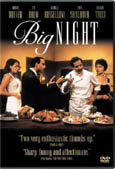 |
Champagne Charlie
A biopic of Charles-Camille Heidsieck, founder of the eponymous Champagne house, who opened the market for Champagne sales in America in 1852. While he met with resistance from American vintners, his high-quality bubbly was praised by the Americans, who gave him the name “Champagne Charlie.” Impressed into duty by his government during the Civil War, the reluctant French spy os captured and spends time in a Union prison. The film has two parallel love stories: over the hand of his mother, who was pursued by his father and his uncle; and for control of the family vineyard. Heidsieck worked hard all his life and was an innovator in the field: he used non-exploding machine-made bottles was the first to recognize the importance of aging the wines and purchased chalk cellars to store them against temperature variations. Charlie is played by the dashing (and then, not-yet-superstar) Hugh Grant, and also stars Megan Gallagher and Megan Follows. Anyone interested in the wine business will love this 1989 made-for-TV film. It should not be confused with a 1944 film about a British music hall star of the same name.—Karen Hochman, TheNibble.com
Click here to purchase the DVD. |
 |
Daughters of the Dust
Working with a theme and history that’s obviously dear to her heart, first-time writer-director Julie Dash’s exquisitely alive film chronicles the last days of the Gullah, an Americanized West African people in danger of losing their identity. Dash makes up for some overly schematic dialogue and an occasionally pokey pace with some strong performances (particularly Cora Lee Day as the sternly matriarchal Nana) and an absolutely wonderful visual sense (kudos should also go to her ace cinematographer Arthur Jafa, whose dazzlingly sumptuous imagery surely inspired Jonathan Demme’s later Beloved). A rapturously textured, wholly mesmerizing glimpse into the Gullah culture.—Andrew Wright
Click here to purchase the DVD. |
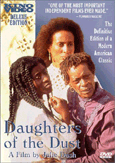 |
The Deli
A “feel good” New York slice-of-life with an ensemble cast of favorites, The Deli, tells the engaging tale of Johnny Amico (Dumb & Dumber’s Mike Starr), a lovable but incorrigibly bad gambler who has a tough time paying the bills at his Italian-American delicatessen. With one week to make good on his debts, Johnny rides a comic roller coaster as he desperately tries to save The Deli while battling a crazy bunch of bookies, gangsters and neighborhood nut jobs.—From Amazon.com
Click here to purchase the DVD. |
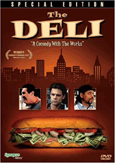 |
Diner
Barry Levinson’s debut film as a writer-director nearly got lost in the shuffle before New York critics rescued it from oblivion. Set in his native Baltimore in 1959, it focuses on a group of pals coping with life post high school. Each of them has problems with women, it seems, whether it’s Steve Guttenberg (as a guy about to get married who forces his fiancée to pass a test about the Baltimore Colts), Mickey Rourke (as the womanizing hairdresser with a gambling problem), or Daniel Stern (as the married one who makes his wife miserable with his carefully cataloged record collection). The only time these guys seem like they have it together is when they gather at the diner to sling the bull. The cast includes Ellen Barkin, Timothy Daly, Paul Reiser, and Kevin Bacon—each in a breakthrough role.—Marshall Fine, from Amazon.com
Click here to purchase the DVD. |
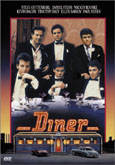 |
Dinner Rush
Dinner Rush is gourmet cinema, served with a generous helping of culinary panache. After countless commercials, music videos (including Michael Jackson’s “Beat It”), and a few obscure features, director and restaurateur Bob Giraldi casts his own New York eatery as a TriBeCa hot spot where the owner (Danny Aiello) presides over a busy night of fine dining and mob entanglements. He’s been a bookmaker for 25 years but he’s going legit; his son (Edoardo Ballerini) is a nuovo cuisine genius, eager to inherit the business; the sous-chef (Kirk Acevedo) is deeply in debt to mafia thugs; an art-dealer snob (Mark Margolis) is antagonizing his waitress (Summer Phoenix); a charming stranger (John Corbett) harbors a climactic surprise; and a powerful food critic (Sandra Bernhard) is ready to pounce on any wrong move. In perfect control of this bustling environment, Giraldi directs like a great chef cooks: with Altmanesque delicacy, confident that every ingredient is vital to the success of his creation. It’s utterly delicious.—Jeff Shannon, from Amazon.com
Click here to purchase the DVD. |
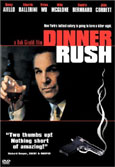 |
The Duchess of Duke Street
From the golden age of Masterpiece Theatre comes this beloved 1976 British miniseries by the creators of Upstairs, Downstairs. Gemma Jones gives a performance for the ages in this rags-to-riches saga that charts the ascendancy of the indomitable Louisa Trotter, who rose from scullery maid to become “the finest cook in London” and Edwardian society’s premier hostess. Inspired by the true story of Rosa Lewis, who held court at her renowned Cavendish Hotel, The Duchess of Duke Street is the video equivalent of a good read. Immerse yourself in this lavishly mounted BBC production that impeccably re-creates a bygone era at the turn of the century and captivates viewers with the tragedies and triumphs of Louisa’s story, which includes an ill-fated affair with the Prince of Wales, an unhappy marriage, and struggles with bankruptcy and ill health. But Louisa, Cockney accent intact, prevails as the reigning mistress of Hotel Bentinck.—Donald Liebenson, from Amazon.com
Click here to purchase the DVD. |
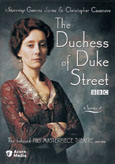 |
Fallen Angels
Fallen Angels was originally planned as one section of director Wong Kar-Wai’s best-known film, Chungking Express, but eventually it grew into its own distinct and delirious shape. In many ways, Fallen Angels may be the better film, a dark, frantic fun-house ride through Hong Kong’s nighttime world. Part of the film is a love story between two people who have barely met: a young, ultra-hip hit man (Leon Lai) and the dreamy operative (Michele Reis) who plans his jobs. Much of the movie is given over to a very strange subplot about a manic mute (Takeshi Kaneshiro) who goes on bizarre nocturnal prowls through a closed food market—like almost everything else in Wong’s films, this is antic, stylish, and oddly touching, all at the same time. It must be said that, also like Wong’s other films, Fallen Angels is fragmented and oblique to the point of occasional incomprehensibility…but then suddenly something wild or wonderful happens, such as the moment when the killer leaves the scene of a spectacular shooting and is promptly waylaid by a cheerful old school chum on a public bus. These coups—whether lyrical, violent, or simply “how on earth did they get that shot?”—are tossed off by Wong and cinematographer Christopher Doyle with all the cool of the hired killer, as though the movie were a cigarette dangling from a pair of oh-so-casual lips. This is exactly why so many otherwise calm critics fell all over themselves in hailing Wong Kar-Wai as one of the most exciting filmmakers of his generation.—Robert Horton, from Amazon.com
Click here to purchase the DVD. |
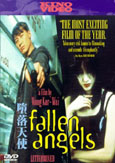 |
Fried Green Tomatoes
Kathy Bates stars as an unhappy wife trying to get her husband’s attention in this amusing and moving 1991 screen adaptation of Fannie Flagg’s novel Fried Green Tomatoes at the Whistle Stop Cafe. After befriending a lonely old woman (Jessica Tandy), Bates hears the story of a lifelong friendship between two other women (Mary Stuary Masterson and Mary-Louise Parker, seen in flashback) who once ran a cafe in town against many personal odds. The tale inspires Bates to take further command over her life, and there director Jon Avnet (Up Close and Personal), in his first feature, has fun with the film. Bates develops a real attitude toward her thickheaded spouse at home and some uppity girls in a parking lot, but dignity is generally the key to Avnet’s approach with the story’s crucial relationships. Tandy is a joy and clearly loves the element of mystery attached to her character, and Masterson and Parker are excellent in the historical sequences.—Tom Keogh, from Amazon.com
Click here to purchase the DVD. |
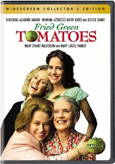 |
Guess Who’s Coming to Dinner?
Spencer Tracy’s last performance was in this well-meaning, handsome film by Stanley Kramer about a pair of white parents (Tracy and Katharine Hepburn) trying to make sense of their daughter’s impending marriage to an African American doctor (Sidney Poitier). The film has been knocked over the years for padding conflict and stoking easy liberalism by making Poitier’s character in every socioeconomic sense a good catch: But what if Kramer had made this stranger a factory worker? Would the audience still find it as easy to accept a mixed-race relationship? But there’s no denying the drawing power of this movie, which gets most of its integrity from the stirring performances of Tracy and Hepburn. When the former (who had been so ill that the production could not get completion insurance) gives a speech toward the end about race, love, and much else, it’s impossible not to be affected by the last great moment in a great actor’s life and career.—Tom Keogh, from Amazon.com
Click here to purchase the DVD. |
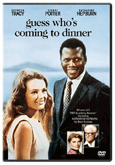 |
Heavy
Not merely a description of corpulent character Pruitt Taylor Vince, the title refers to the leaden atmosphere hanging over a roadside café and its inhabitants. Writer-director James Mangold finds significance in the details of life, giving this touching story an authenticity that keeps us involved. Liv Tyler brings poignancy to the story as a college dropout who helps awaken the introverted and depressed Vince. Unfortunately, this fascinating character study is too often undermined by direction slow enough to be leaden. Happily, even the most stolid camera work cannot undermine the desires and insecurities of the main character, a man yearning for a full life but too afraid too take a chance.—Rochelle O’Gorman, from Amazon.com
Click here to purchase the DVD. |
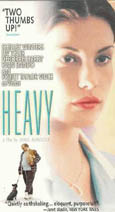 |
The Legend of Alfred Packer
An eerie movie based on the true story of a man who led a group of hopeful gold-miners to a site in Colorado in 1873. The cold winter strands them from civilization and as rations run out, the only survivor, Alfred Packer survived by resorting to cannibalism.—Melissa Hom, TheNibble.com
Click here to purchase the VHS tape.
|
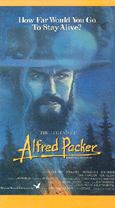 |
Like Water for Chocolate
Expect to be very hungry (and perhaps amorous) after watching this contemporary classic in the small genre of food movies that includes Babette’s Feast and Big Night. Director Alfonso Arau (A Walk in the Clouds), adapting a novel by his former wife, Laura Esquivel, tells the story of a young woman (Lumi Cavazos) who learns to suppress her passions under the eye of a stern mother, but channels them into her cooking. The result is a steady stream of cuisine so delicious as to be an almost erotic experience for those lucky enough to have a bite. The film’s quotient of magic realism feels a little stock, but the story line is good and Arau’s affinity for the sensuality of food (and of nature) is sublime. You might want to rush off to a good Mexican restaurant afterward, but that’s a good thing.—Tom Keogh, from Amazon.com
Click here to purchase the DVD. |
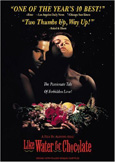 |
My Dinner with Andre
Wallace Shawn and Andre Gregory, apparently playing themselves, share their lives over the course of an evening meal at a restaurant. Gregory, a theater director from New York, is the more talkative of the pair. He relates to Shawn his tales of dropping out, traveling around the world, and experiencing the variety of ways people live, such as a monk who could balance his entire weight on his fingertips. Shawn listens avidly, but questions the value of Gregory’s seeming abandonment of the pragmatic aspects of life.—From Amazon.com
Click here to purchase the DVD. |
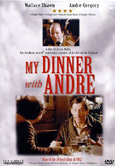 |
Mystic Pizza
A sweet and sassy comedy about the bonds of sisterhood, Mystic Pizza offers the opportunity to see some solid young actors early in their careers. Three sisters of blue-collar Portuguese descent work in a pizzeria in the coastal town of Mystic, Connecticut. Each has her own unique romantic entanglements. One is the fast girl in town (Julia Roberts), who falls for a rich kid but wonders if she’ll ever be accepted; one is the lifelong local girl (Lili Taylor) in love with her fisherman boyfriend (Vincent D’Onofrio) but scared of what marriage will do to their sex lives; and the youngest sister (Annabeth Gish) dreams of going to Yale but during a summer of baby-sitting has an affair with a married man. Through it all each sister depends on the others regardless of the complications. It’s the alluring charm of the three disparate leads that makes Mystic Pizza the delightful experience it is.—Robert Lane, from Amazon.com
Click here to purchase the DVD. |
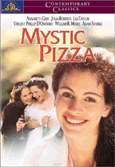 |
Satyricon
Two student friends in first century Rome under Nero’s reign divide themselves over a common love interest – only to cause a divide in the earth with an earthquake. Their finger-licking hedonistic travels lead them to adventure and encounters with the demi-divine.—Melissa Hom, TheNibble.com
Click here to purchase the DVD. |
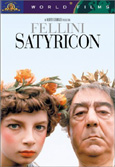 |
The Scent of the Green Papaya
“Watching it is like seeing a poem for the eyes.” That’s how Chicago Sun-Times critic Roger Ebert described this exquisite, Oscar-nominated, French-Vietnamese film from 1993, which begins in the 1950s and ends more than a decade later during the early years of the Vietnam war. The story is set almost entirely in a Saigon house where a 10-year-old orphan girl named Mui arrives to work as a servant. As she grows into a beautiful young woman, Mui is quietly and carefully observant of everything around her, from the scent of green papaya (hence the title) to the relationship between her employers. The film takes its visual cues from Mui’s observations—it’s a placid, soothing film that lingers over the physical and emotional details of its setting and story. What’s really astonishing about this beautiful film is that director Anh Tran Hung shot it entirely on a soundstage in Paris, but the sights and sounds are so completely convincing that you’d swear the setting is an actual home in Saigon. This remarkable craftsmanship remains invisible to the viewer, and the seductive progression of the story unfolds with exacting visual precision. It’s a film about Mui’s growth and development, but also about her benevolent effect on the world around her. As such, it’s a movie to savor like no other, life affirming and glorious in the memorable depth of its captivating simplicity.—Jeff Shannon, from Amazon.com
Click here to purchase the DVD. |
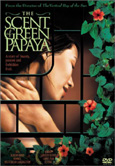 |
Sideways
With Sideways, Paul Giamatti (American Splendor, Storytelling) has become an unlikely but engaging romantic lead. Struggling novelist and wine connoisseur Miles (Giamatti) takes his best friend Jack (Thomas Haden Church, Wings) on a wine-tasting tour of California vineyards for a kind of extended bachelor party. Almost immediately, Jack’s insatiable need to sow some wild oats before his marriage leads them into double-dates with a rambunctious wine pourer (Sandra Oh, Under the Tuscan Sun) and a recently divorced waitress (Virginia Madsen, The Hot Spot)—and Miles discovers a little hope that he hasn’t let himself feel in a long time. Sideways is a modest but finely tuned film; with gentle compassion, it explores the failures, struggles, and lowered expectations of mid-life. Giamatti makes regret and self-loathing sympathetic, almost sweet. From the director of Election and About Schmidt.—Bret Fetzer, from Amazon.com
Click here to purchase the DVD. |
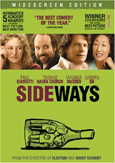 |
Soul Food
Twenty-eight-year-old writer-director George Tillman Jr. drew autobiographical inspiration from his upbringing in Milwaukee, and on a well-spent $6.5 million budget he succeeded where similar films (including Waiting to Exhale and How Stella Got Her Groove Back) fell short: He depicts his many characters with such depth and sympathy that, by the time they have weathered several family crises, we’ve come to care and feel for them and the powerful ties that bind them together. Tillman’s touch can be overly nostalgic, melodramatic, and cloyingly sentimental, but never so much that the movie loses its firm grip on reality. As a universal portrait of family life, Soul Food ranks among the very best films of its kind—believable, funny, emotional, and always approaching its characters (well-played by a uniformly excellent cast) with a generous spirit of forgiveness and understanding. As satisfying as one of Big Mama’s delicious dinners, Soul Food is the kind of movie that keeps you coming back for more.—Jeff Shannon, from Amazon.com
|
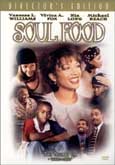 |
Tortilla Soup
The tantalizing genre of food films—stretching from Babette’s Feast to Big Night and beyond—has a delicious new addition, Tortilla Soup. The food-preparation scenes will make your mouth water. Fortunately, the rest of the movie holds up as well. Hector Elizondo plays Martin, a widowed chef who is losing both his sense of taste and control over his three daughters: Leticia (the always superb Elizabeth Peña), a religious schoolteacher; Carmen (Jacqueline Obradors), a successful but unhappy businesswoman still carrying on an affair with her ex-boyfriend; and Maribel (Tamara Mello), a rebellious teen falling in love with a young Brazilian. When a pushy, nosy, but very sexy widow named Hortensia (Raquel Welch) comes along, the troublesome subcurrents in the family start to surface. Elizondo’s understated gravitas anchors the story, while the three sisters have sex, eat amazing-looking food, and break plates in the kitchen.—Bret Fetzer, from Amazon.com
Click here to purchase the DVD. |
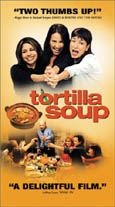 |
Vatel
Starring Uma Thurman (The Avengers, Pulp Fiction), Gerard Depardieu (The Closet), and Tim Roth (Rob Roy), Vatel is based on the true story of an ordinary man, a decadent king, and the woman caught between them! In the west of France, Prince de Conde has a scheme to save his bankrupt province: he’ll regain the favor of King Louis XIV with a weekend of spectacle and merriment. The plan’s success rests with Vatel (Depardieu), the one man who can deliver sumptuous food, elaborate amusements, and all-out decadence fit for this king. But in the midst of it all, Vatel catches the eye of the beautiful Anne (Thurman)...and places himself in direct competition with the King! Visually stunning and grandly entertaining, it’s a motion picture you must see to believe!—From Amazon.com
Click here to purchase on DVD. |
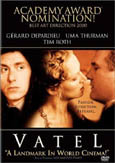 |
A Walk in the Clouds
Keanu Reeves is completely wooden in this romantic misfire by Alfonso Arau (Like Water for Chocolate). Reeves plays a World War II vet who hits the road as a traveling salesman and agrees to help a desperate, pregnant woman (Aitana Sanchez-Gijon)—who is afraid to let her father (Giancarlo Giannini) see her condition—by pretending to be her husband. Most of the story takes place in the old man’s vineyard, and Arau makes a life of swollen fruit, grape-stomping, sunlight, and tan flesh that looks amazingly erotic. But there are plenty of sillier distractions, such as the sight of farm hands chasing insects with flapping gossamer wings attached to their arms. Reeves is terribly self-conscious, while stalwart Anthony Quinn is memorable as the damsel’s benevolent grandfather.—Tom Keogh, from Amazon.com
Click here to purchase the DVD. |
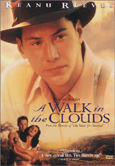 |
What’s Cooking?
At first glance, What’s Cooking? looks like it was dreamed up by some politically correct screenwriting committee: a series of overlapping stories that intercut among four families (one Hispanic, one Vietnamese, one African American, one Jewish) all preparing for Thanksgiving dinner. But what could be toothless and smarmy is made gripping and genuinely affecting by a mixture of observant writing, fluid direction, and a truly superb ensemble of actors, including Mercedes Ruehl, Alfre Woodard, Joan Chen, Julianna Margulies, Kyra Sedgewick, Dennis Haysbert, and a host of less well known but just as capable others. The script is a marvel of orchestration: small annoyances blossom into fierce conflicts, secrets are deftly revealed, and sanctimoniousness is subtly punctured. The acute but sympathetic portrait of family stress and tension is layered with quiet observations about race and class, as well as the capacity for tolerance and forgiveness. It’s recently become a cliché to have characters express themselves through food (examples include Soul Food, Big Night, and Eat Drink Man Woman), but What’s Cooking? turns food into a witty exploration of culture as everyone prepares their turkeys in entertainingly different ways—this is not a movie to watch on an empty stomach. Warm without false sentiment, What’s Cooking? is deeply enjoyable.—Bret Fetzer, from Amazon.com
Click here to purchase on DVD. |
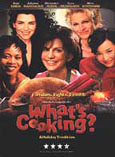 |
The Wedding Banquet
This 1993 international hit by Ang Lee is a funny and poignant story of a gay, Taiwanese-American man who goes to some lengths to fool his visiting family that he’s actually straight. The results are far more complicated and entertaining than anyone could have guessed. The film seems all the more rich now since Lee has become a major Hollywood director: that same sensitivity and mild bemusement he brought to such stories of manners as Sense and Sensibility and The Ice Storm in recent years are in full bloom in this earlier work.—Tom Keogh, from Amazon.com
Click here to purchase the DVD. |
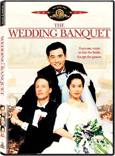 |
| |
|
© Copyright 2005-
2025
Lifestyle Direct, Inc. All rights reserved. Images are the copyright of their individual owners.
|































